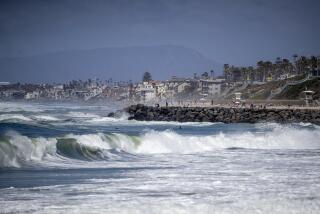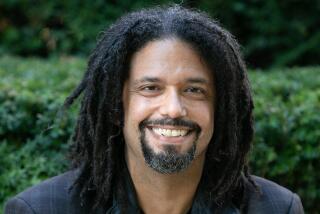Smoking Ban at Stadium Seen as Inevitable : Health: Although the Marlboro sign won’t go soon, San Diego Jack Murphy Stadium is likely to follow other venues in barring smoking, officials say.
- Share via
When the nine-member board that oversees San Diego Jack Murphy Stadium first considered a ban on smoking two years ago, the tobacco lobby showed up almost overnight to protest.
After hearing evidence about the effects of smoking and so-called “secondhand” smoke, the board passed a watered-down measure that led to the posting of the following message on the scoreboard during stadium events:
“The Stadium Authority requests if you smoke, please be considerate to your neighbors.”
After last week’s meeting of the Stadium Authority Board, it became apparent that lobbying by anti-smoking forces is once again mounting, and afterward, stadium officials conceded that a ban, at some point, is probably unavoidable.
“It’s only a matter of when,” Stadium Manager Bill Wilson said.
Dr. Ira Goldstein, chairman of the San Diego County Health Advisory Board, appeared before the stadium board last week to argue vehemently about the dangers of secondhand smoke and to insist that the stadium remove the familiar billboard near the scoreboard.
“The Marlboro Man has to go,” Goldstein said. “That sign is a travesty in the stadium. All the kids that go there--it’s a shame for them to see that sign. The thing has to be replaced.”
That would be the decision of the San Diego Padres, from whom the cigarette company leases the sign. The lease does not expire until 1993, and because of its lucrative dividends, the sign isn’t likely to disappear, stadium officials said.
Bill Adams, a spokesman for the Padres, said removal of the Marlboro sign has not been considered and won’t be. He said the amount of money received for the sign is “confidential.”
Adams said the desecration of the sign in June by Donald G. House--who last month was convicted of four vandalism charges--was “in no way” indicative of public opposition to the cowboy-hatted Marlboro Man peering out over right-center field.
Adams said that House, who was fined $400 and ordered to perform 150 hours of community service work, was “just a guy on a crusade,” although state Assemblyman Mike Gotch (D-San Diego), a fierce anti-smoking crusader, recently said that House “deserves to be commended.”
Adams said the issue of a ban is one that “comes and goes” in the Padres’ organization, “although we do spend a lot of time talking about it.” He said the team now offers four no-smoking sections.
Adams said he senses “no kind of public outcry about people wanting a ban.”
Rich Israel, director of marketing for the San Diego Chargers, said the football team increasingly finds itself responding to complaints from nonsmokers.
“A ban? We’re undecided,” Israel said. “We’re in discussion on the matter. It’s being considered very seriously. We have taken steps to limit smoking in the seating areas (with seven no-smoking sections). Ultimately, I think the city will enact an ordinance. But, as a tenant, we feel we have something to say. Any tenant is in the position of trying to please all of the people all of the time, and that’s the hard part.”
Wilson said an outright ban--which would be the decision of the San Diego City Council--would make it easier for tenants, who, in recessionary times, with less-than-stellar teams, are reluctant to offend any constituency.
At the height of its popularity--and success--two years ago, the Oakland A’s baseball team succeeded in banning smoking at the Oakland-Alameda County Coliseum during A’s games. Wilson said people can smoke at the Oakland stadium during any other event.
Because other cities and other stadiums have enacted bans on smoking, such as the Stanford University stadium and the Minneapolis Metrodome, Gotch said that, even if a ban is enacted, San Diego would be a mere follower, hardly a leader.
It was Gotch, who, as a Stadium Authority Board member, led the pro-ban forces in 1988. Gotch said he was particularly concerned about the effects of secondary smoke.
“You need only look at the health aspects of side-stream smoke,” he said. “The carbon monoxide level from side-stream smoke is 15 times higher, as are the effects of tar and nicotine.
“It’s never been a matter of trying to legislate good manners. It’s simply a desire to keep patrons free of the adverse effects of smoking.”
Gotch said his notion of a ban was to limit smoking at the stadium to the walkways and concourse area and not to restrict smokers entirely. Given the statistic that 29% of the American population smokes, it would make more sense, he said, to have a handful of smoking sections rather than one or two that prohibit smoking.
Wilson said the board is “tired” of the smoking issue and wishes it would go away, but obviously, it won’t.
“An ordinance would make it easy on the tenants,” he said. “Look at what’s happened to smoking on airlines. When the time comes, it will be banned--not just here, but at stadiums all over the country. It’s only a matter of time.”
More to Read
Go beyond the scoreboard
Get the latest on L.A.'s teams in the daily Sports Report newsletter.
You may occasionally receive promotional content from the Los Angeles Times.










